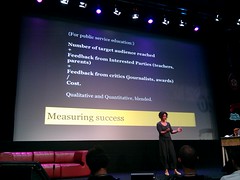LIFT 2010: What's up with online communities?
 The Transition from Broadcast to Multiplatform for a public service broadcaster: getting attention and measuring success, Alice Taylor, Channel 4
The Transition from Broadcast to Multiplatform for a public service broadcaster: getting attention and measuring success, Alice Taylor, Channel 4
Channel 4 Education's target audience is (will be) 12-19 year old. They weren't watching much TV in the morning slots, so now CH4 go where they are: online.
One myth about teenagers is that they have the latest technology. They don't: it's mostly broken, hand-me-down. Only 1/4 of teenagers self-describe as mainstream.
In broadcasters, digital projects are usually "support". That's not the case for Alice's folks. An hour of TV usually costs 100k (40-60k if it was cheap, 150k if it was expensive): a rough audience of 100k for £100k. Can online do better?
What kinds of things? Games, TVs with tools, TV/app blends. Not much iPhone (3.5% of UK have iPhone, a subset of them are teenagers). The majority is on games.
In the UK, all top 10 destination sites for UK teenagers are American.
Using Bittorrent for distribution of Science of Scams. Unusual for a broadcaster.
Success is a combination of number of target audience reached, feedback from interested parties, feedback from critics, divided by cost: a blend of qualitative and quantitative.
Games lead to long dwell times: 15-25m. TV *can* do, but adding things around it (a celebrity for Science of Scams) can help.
Jean Burgess, Youtube's unfolding history
Youtube is 5 years old this year. Started as a dating-ish site. Youtube was underdetermined from the very start. Bedroom as vaudeville stage. Large proportion of content was video-blogged, a format that predates Youtube. A subset of the Youtube community sees itself as, and functions as, a community. The most subscribed channels have emerged organically from this "Youtube social network" - very few are large media brands.
Is Youtube a file-sharing/piracy site? No. The company is quarantining off big media into curated areas, away from the messy activities of Youtube users. Youtube is the biggest museum of television in the world, but its content has been selected collectively by its users - so it's an archive of public culture and has public value even though Youtube is not a public organisation.
Then there's remix culture: Downfall parodies, say. The messiness of our everyday practices when it comes to audiences or producing content are not compatible with the dominant business logic of the broadcast media.
Participation in user-created content is not universal.